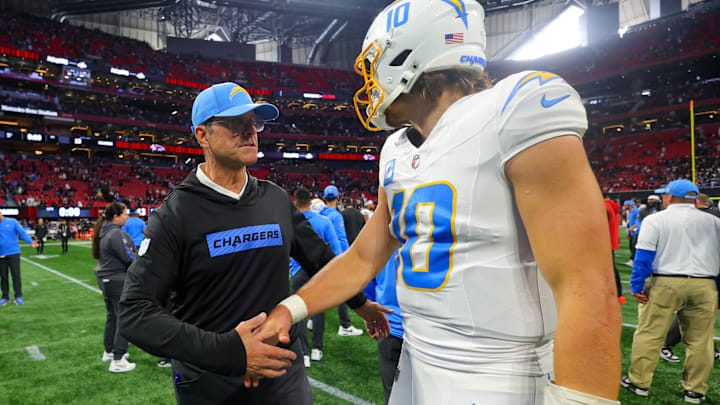Chargers' Harbaugh reveals Bo's bold challenge that catapulted him as Michigan QB

In this story:
Los Angeles Chargers' head coach Jim Harbaugh has had some incredible influences in his life from his father Jack, a Division 1A college head coach, as well as his older brother, John, the very successful head coach of the Baltimore Ravens.
There is one man, outside of his family, that also influenced Harbaugh greatly, both as a player and a person: The legendary head coach of the Michigan Wolverines -- Bo Schembechler.
Schembechler recruited Harbaugh to Ann Arbor in 1982. He knew the family well as father Jack had been Bo's DB coach from 1973-1979. Young Jim arrived on campus with a lot of confidence (is this a surprise?) and there was talk of him playing much sooner than later. Schembechler was a bit old school and wasn't about to start a true freshman. He was also a keen evaluator of talent and personality so while Harbaugh was hailed as Michigan "passer of the future", he didn't start his sophomore year either.
Going into the 1984 season, the Wolverines were looking for a starting quarterback. It's hard to imagine, looking back at Harbaugh's collegiate and professional career -- as a player and a coach -- that he wasn't going to be the defacto starter. If Schembechler was sold on Cool Jim as his starter, he knew making him work for it was the smartest way to go, both for Harbaugh and the team -- and his method of motivating his young signalcaller was pure Schembechler gold, as Harbaugh related on The Glue Guys Podcast recently.
Harbaugh went on to be the starting QB at Michigan for the next three years, winning three Big Ten championships, earning Big Ten Player of the Year (1986) Second-Team All-American (1986) and finishing third in voting for the 1986 Heisman Trophy. Harbaugh was Michigan's all-time record holder for passing yards with 5,449 yards, had a 62.4% completion percentage, and threw 31 touchdown passes -- not bad for a program that was known for running the football.

Harbaugh revered Schembechler and obviously learned quite a bit from his former coach about getting the most out of players --- as well as winning, something he sparked in the Chargers in his first season as head coach. As the race for the AFC West looks to be heated, one thing Harbaugh's players know, their head man is not afraid of a challenge.
More Los Angeles Chargers News:
Chargers unexpectedly soar in power rankings after Jim Harbaugh 'bully' debut season
Chargers GM's hilarious draft evaluation of Adam Sandler, Tom Hanks, actors in football films
Chargers-Bengals epic trade proposal would reshape the NFL as we know it
Jim Harbaugh set to meet old friend in Chargers Week 8 matchup
NFL schedule release: Chargers roast opposing teams with epic Pop-Tart comparisons

A Michigan native, Brian graduated from the University of Michigan in another century, where he earned a degree in economics and a Rose Bowl Championship ring while playing football for the Wolverines under Head Coach Gary Moeller. Brian went on to coach Division 1A football for several years before becoming a full-time writer and actor while maintaining an unhealthy interest in sports. He is currently developing a scripted television series, THOSE WHO STAY, based on a series of historical fiction articles he wrote about Bo Schembechler's Michigan football program as they struggle to unite and win the championship - which requires beating #1 Ohio State - during the tumultuous civil rights and anti-war movements of 1969.